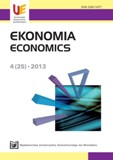Kontrolowana liberalizacja versus niechęć do konkurencji na przykładzie rynku usług użyteczności publicznej w Unii Europejskiej
Controlled liberalization versus vested interests. The case of the eu market for general service
Author(s): Anna Ząbkowicz, Jerzy ZąbkowiczSubject(s): Economy
Published by: Wydawnictwo Uniwersytetu Ekonomicznego we Wrocławiu
Keywords: public aid; universal services; rent seeking
Summary/Abstract: The paper deals with entry barriers induced by public aid and actual monopoly in a given market segment. The EU law on competition constitutes the subject, being seen, however, from economic perspective, which is the method of law and economics. The focus are universal services which seem to be extremely vulnerable to the monopolization of public procurement and to unfair state aid, and to rent seeking as well. The overview of legal foundations reveals the EU regulations are too soft to bring a solution to these problems. Additionally, the soft stance of EU institutions by no means makes the situation sounder. As far as universal services are concerned, the member states are free to choose agents, with constraints imposed by the EU being of definitely general nature and the rationale for this saying that these services need to be delivered even on non-profit basis if necessary. Here, we see the EU aiming at two trade-offs that is liberalization on the one hand and mission of the efficiently performed universal service on the other hand. On the EU level common rules of providing universal services are made which are to be implemented on the national level. According to the European Commission, such “division of labour” allows an action which is suitable to peculiarities of every member state. In practice, such elasticity provokes national public bodies to moral hazard. This constitutes an actual challenge for common policies in the sake of gradual and controlled liberalization. There is a prolonged conflict between member states and the EU institutions concerning the issue in which direction rules in this field should be developed. The market segment under scrutiny, precisely market for universal services, reveals how controversial role in single-European-market building may be played by big companies. Most member states are prone to prefer agents vested in their countries. This peculiar alliance is supported with administrative devices that make the preferred group relatively narrow. Thus the state conserves actual monopoly and encourages rent seeking, and demonstrates its own weakness in promoting competitive order. Under such circumstances, by contrast to the EU endeavors to promote and to control economic liberalization in the member states, both the payer (public institution) and the provider (economic agent) may present an open aversion to competition. Obviously, this status quo is in contradiction to a general trend in the EU to guarantee equal access to public procurement, also in transnational dimension. Other conflicts arise on the ground that countries differ concerning a bare need for liberalization of universal services or with respect to advancement of the reforms. In some countries liberalization is advanced which means relatively open and equal access to public procurement, including foreign agents. Other countries discriminate agents, both foreign and non-privileged home operators.
Journal: Ekonomia
- Issue Year: 2013
- Issue No: 25
- Page Range: 210-227
- Page Count: 18
- Language: Polish

